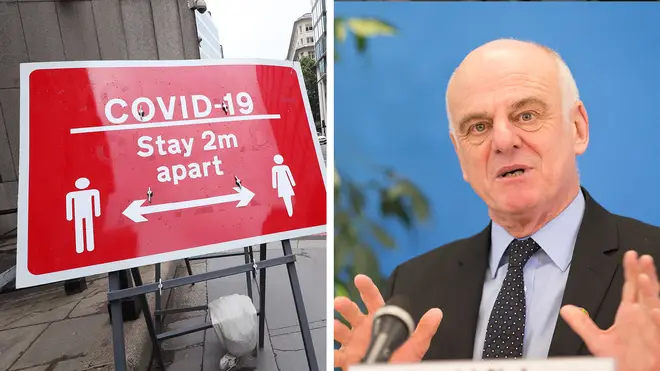
Ian Payne 4am - 7am
12 June 2020, 08:52

WHO expert explains difference between 2m and 1m rule
The Special Envoy to the World Health Organisation told Nick Ferrari that there will be a greater risk if the government reduce the two-metre rule to one-metre.
Calls have been growing to half the social distancing guideline to allow pubs and restaurants to be able to operate.
World Health Organisation rules suggest a minimum of one metre, but the UK has remained at two. Dr David Nabarro told LBC that it's all about the amount of risk you want to take.
He said: "It's about risk. If you go one metre away from somebody who's got the virus, you're more likely to get infected that if you're two metres.
"So everybody has to make a judgement of how much risk they are prepared to take.
"None of us working in world health are going to say there are strict rules on this. What we will say is the evidence that we've seen suggests that the closer you are to somebody who's got the disease, the more likely you are to get it.
"Please try to be at least one metre. If you can be two metres, then great. But we know there will have to be some flexibility."

Will the 2 metre rule be relaxed?
Nick asked how he thinks the UK should balance restoring the economy with the need to keep a distance from each other.
He responded: "Please remember that not everybody is at the same risk as everybody else. If we're talking about bars and restaurants, the people most at risk are the people who are providing the service. If we're talking about public transport, then it's the drivers. If we're talking about how offices are looked after, then it's the cleaners.
"Let's try to make absolutely certain we're doing everything possible to protect them. That means enabling them to keep some distance.
"Most of the evidence we've seen suggests that the people who are in these service roles have a tougher job than the rest of us in keeping their distance.

"Secondly, I remain utterly committed to encouraging masking when people are in public places. It's distancing and it's being really responsible when we're sick.
"Finally, distancing is much more important when we're in confined spaces. When we're out in the open, the likelihood of spreading is so much less. So we can apply some quite good common sense here."
Listen & subscribe: Global Player | Apple Podcasts | Google Podcasts | Spotify